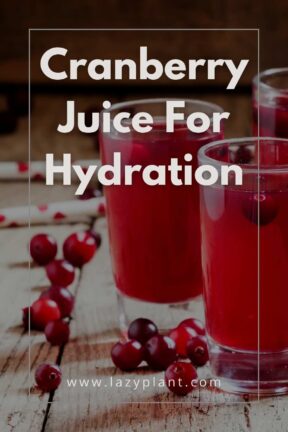Cranberry juice hydrates you better than water because it’s high in 3 main electrolytes. A cup provides 9% DV potassium, 5% DV magnesium, and 3% DV calcium!
We need both electrolytes & water for good hydration
Electrolytes are essential minerals, and they’re vital for the proper function of the body. Among other health benefits, they’re involved in functions of the nervous system and muscle contraction.
When we sweat, we lose more than water. We lose electrolytes as well. We have to replenish both. Especially, athletes, fitness enthusiasts, and active people may lose high amounts of electrolytes. They have to replenish them as soon as possible.
We also lose electrolytes in the urine. Vomiting and diarrhea can cause excessive electrolyte losses as well.
Electrolyte imbalances may cause muscle weakness, fatigue, nausea, headaches, and many more adverse effects. However, in most cases, people who have mild electrolyte imbalances don’t experience any symptoms.
Sweating leads to dehydration. We need to get water and electrolytes as soon as possible. But, just drinking plain water is bad for our health. It’ll cause even greater electrolyte imbalances! We have to replenish both water and electrolytes for proper hydration.
What electrolytes does cranberry juice lack?
The main electrolytes which we have to replenish daily are sodium, chloride, potassium, magnesium, and calcium.
Cranberry juice has negligible amounts of sodium and chloride. However, we can easily get sodium and chloride from table salt.

Actually, the scientific name of table salt is sodium chloride! Just a tsp of salt contains 2,300 mg of sodium and 3,450 mg of chloride. More than we actually need per day.[1,2,3]
The recommended daily intake of sodium is only 1,500 mg and 2,300 mg for chloride. Higher doses are linked to adverse health effects.
People who follow the standard Western diet consume much higher amounts of sodium and chloride, though. Fast food and processed products are pretty high in salt.
Even elite athletes, who exercise in extreme heat, can easily get the extra required amount of sodium and chloride from table salt.
What electrolytes are abundant in cranberry juice?
Drinking cranberry juice hydrates you better than water, as it’s high in potassium, while it contains decent amounts of magnesium and calcium. You could enjoy this rejuvenating drink in the summer or after strenuous exercise.
A cup of cranberry juice contains about:[4]
- potassium: 240 mg or 7% DV
- magnesium: 17.4 mg or 4% DV
- calcium: 27 mg or 3% DV
In addition, cranberry juice is healthy because it contains traces of many other minerals like iron. Also, cranberry juice is particularly rich in vitamin C, melatonin, and antioxidants!
Moreover, a glass of cranberry juice hydrates the body because it contains up to 270 grams of water. People who have a hard time drinking plain water could benefit the most from drinking fruit juices in moderation.
You can drink cranberry juice in the morning, after exercise, or at dinner.
Is cranberry juice good for hydration?
Cranberry juice is packed with vitamins and antioxidants, which are beneficial for the body. But, we shouldn’t depend on it for our hydration. As all fruit juices, cranberry juice contains too many calories and sugar!
You should drink only a cup of cranberry juice a day if you want to lose weight.
Most people should avoid the regular consumption of high amounts of cranberry or any other fruit juice.
Actually, the best way to stay hydrated is to drink a lot of water, and consume a wide variety of foods high in electrolytes. Whole fruits, vegetables, seeds, and nuts are great natural sources of the main electrolytes.